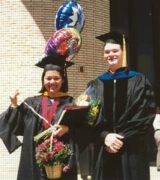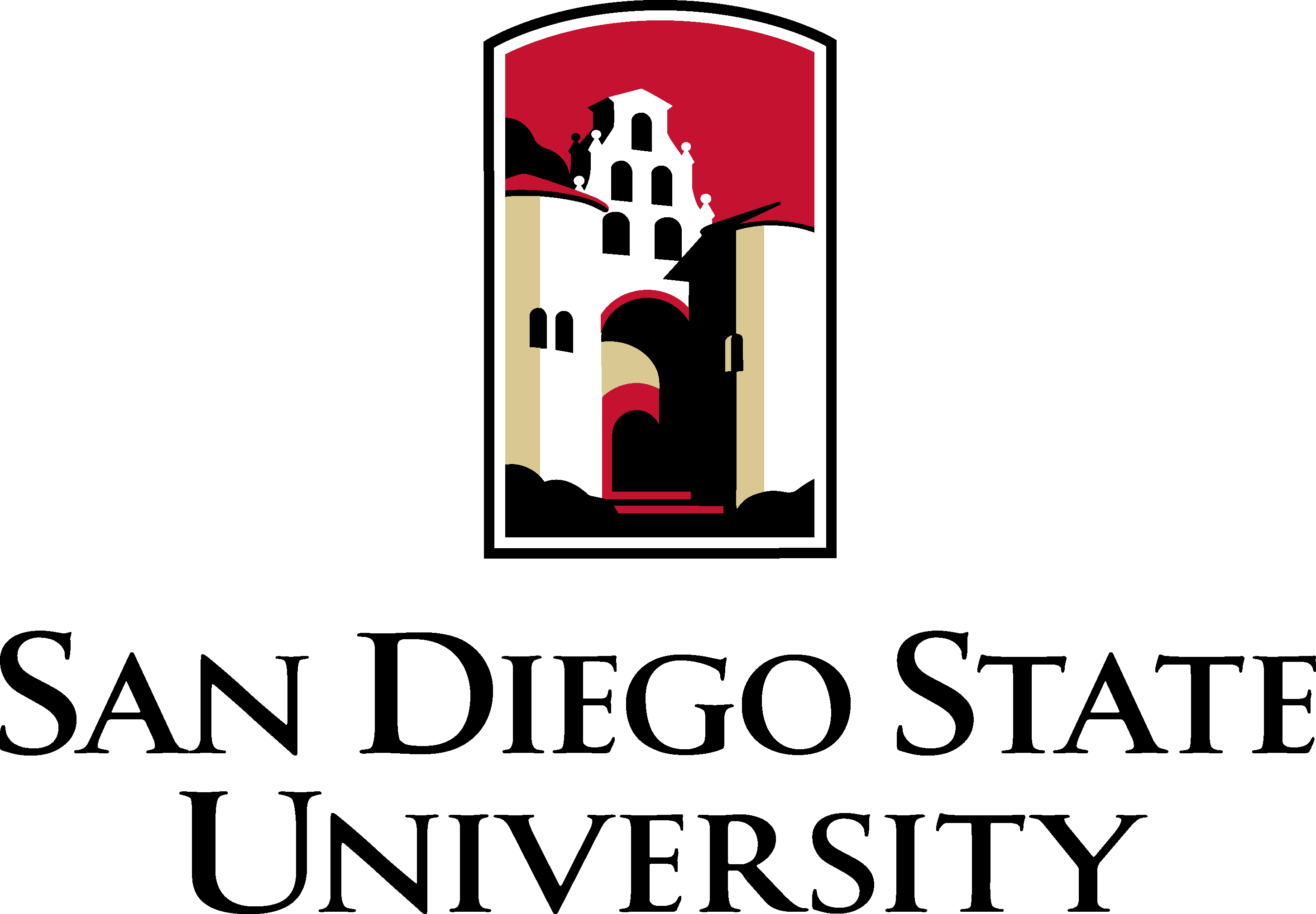
The Department of Chemistry and Biochemistry at SDSU offers the following degrees:
- Bachelor of Arts (B.A.)
- Bachelor of Science (B.S.)
- Bachelor of Science (B.S.) with Emphasis in Biochemistry
- Bachelor of Science (B.S.) in Chemical Physics
- Master of Arts (M.A.)
- Master of Science (M.S.)
- Doctor of Philosophy (Ph.D.)
(Joint Doctoral Program with UCSD)
Undergraduate Program
Information on the undergraduate degrees can be found in the Chemistry section of the General Catalog.
Graduate Program
Overview
SDSU provides excellent opportunities for graduate work in chemistry at the M.A., M.S., and Ph.D. degree levels. All major areas of chemistry are represented: analytical, inorganic, physical, and organic chemistry as well as biochemistry. Whether you are a student who has definite degree objectives or a student who is not entirely sure about your degree objectives, we offer a program that may be right for you!
The chemistry graduate program at SDSU is large enough to offer a variety of course and research options, yet small enough that you will not get lost in the crowd. Each of our graduate students is important to us and we strive to give each student the personal attention needed to make sure his or her graduate career at SDSU is both successful and rewarding.
Programs of Study
All graduate students are admitted into our graduate program with unclassified status. Although the requirements for advancement to classified status can vary, all students are required to show competency in four of the five general areas of chemistry either by passing orientation exams or by taking courses in the appropriate areas of chemistry. The orientation exams are given 1–2 weeks before classes begin in both the Fall and Spring semesters.
UCSD-SDSU Joint Doctoral Program
The Ph.D. degree is offered jointly with the University of California at San Diego (UCSD) Department of Chemistry and Biochemistry through the Joint Doctoral Program (JDP). Students in the JDP are admitted into the graduate programs of both institutions, and spend one year in full-time residence at UCSD, in which they take courses and serve as teaching assistants for one quarter. The remainder of the coursework and research for the Ph.D. degree are carried out under the direction of a faculty member at SDSU. Students in the JDP are required to pass a qualifying examination in order to advance to candidacy for the degree. Candidates for the Ph.D. degree then complete a dissertation based on their research, which must be successfully defended to a joint committee consisting of faculty members from both UCSD and SDSU. Please also see UCSD's description of this program.
M.S. Degree Program
We offer a strong Masters of Science program with both coursework and research requirements. The M.S. degree at SDSU is a respected degree, not merely a “consolation prize” for those students who don’t succeed in the Ph.D. program. Graduates from our M.S. degree program have been very successful in obtaining jobs, particularly in the Southern California area. Requirements for the M.S. degree include the completion of 30 units of graduate credit and the successful oral defense of a research thesis. This program is ideal for students who want essential research experience but do not wish to advance or wish to postpone advancement toward the Ph.D. degree.
M.A. Degree Program
Students in this program are required to complete 30 units of graduate credit, at least 24 of which are in chemistry. The student is free to take any course listed as acceptable in the Graduate Bulletin; however, the student must take courses in areas in which he or she is deficient (as demonstrated by the orientation exams). The final requirement is to write a paper approved by the departmental graduate advisor or take a written comprehensive exam. This program is ideal for students who do not feel that they need research experience. Many people employed in local industries choose this route. To accommodate these people, we try to offer graduate courses in the evening whenever possible.
Admission Requirements
The requirements for admission into the M.A. or M.S. program are the following.
- A minimum GPA of 2.85, both overall and in chemistry courses.
- A bachelors degree in chemistry or a related subject.
- A minimum value of 900 for the sum of the verbal and quantitative scores on the general GRE exam (www.ets.org, SDSU Institution Code 4682).
- If medium of instruction was in a language other than English, a satisfactory score on the TOEFL exam (www.ets.org, SDSU Institution Code 4682). Acceptable minimum scores are as follows: 550 on the paper-based TOEFL, 213 on the computer-based TOEFL, and 79 on the Internet-based TOEFL. The International English Language Testing System (IELTS) may substitute for the TOEFL exam for graduate students for whom English is a second language. The SDSU minimum acceptable score for this test is 7.0. For information on the exam please see www.ielts.org.
- Three current recommendation letters acknowledging the applicant's academic and research capabilities.
The system-wide Cal State Apply form is required by our Graduate School. Please also make sure to find our Departmental Application form and return it to the Department of Chemistry and Biochemistry at the address below.
Official transcripts (in sealed envelopes) from all postsecondary institutions attended, GRE, and TOEFL scores should be mailed to the following address.
Graduate Admissions
Enrollment Services
San Diego State University
5500 Campanile Drive
San Diego, CA 92182-7416
Telephone: (619) 594-6336
E-mail: gra@mail.sdsu.edu
- Students who attended SDSU need only submit transcripts for work completed since last attendance.
- Students with international coursework must submit both the official transcript and proof of degree. If documents are in a language other than English, they must be accompanied by a certified English translation.
- GRE and TOEFL scores can be submitted through www.ets.org, SDSU institution code 4682.
All other application materials and questions about application status should be addressed to:
Attn: Graduate Admissions
Department of Chemistry and Biochemistry
5500 Campanile Drive
San Diego State University
San Diego, CA 92182-1030 USA
619-594-5595
These conditions are sometimes relaxed for students who have research or development experience in the chemical or biochemical fields.
Students are initially admitted into the masters program. After a one-year residency, masters students can apply for candidacy into the Joint Doctoral Program. Our program is unique because it allows students with a relatively weak undergraduate record to strengthen their academic record and to begin focusing on research projects before committing themselves to the rigors of Ph.D. work. For these students, admission into the JDP is based on a review of graduate course grades, GRE scores, and recommendations, particularly from the student’s research advisor.
Financial Assistance
Financial support for qualified graduate students may be provided in the form of research and teaching assistantships. Typically, most candidates admitted to the program are supported on teaching assistantships, and may be supported on research or teaching assistantships for subsequent years. Research assistantships are arranged between the student and their faculty research advisor, whereas teaching assistantships are adminstered through the department.
Please be aware that the printed Graduate Bulletin is the official publication for San Diego State University regarding graduate requirements and procedures.
If you have any questions concerning our graduate programs, please do not hesitate to contact us by e-mail (cheminfo@sdsu.edu) or phone (619-594-5595).
